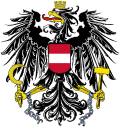| President of the National Council Präsident des Nationalrates | |
|---|---|
 | |
| National Council of Austria | |
| Style | Mr. President (when addressed in parliament) |
| Status | Primary presiding officer |
| Member of | National Council |
| Seat | Austrian Parliament Building, Innere Stadt, Vienna |
| Nominator | Political parties |
| Appointer | National Council |
| Constituting instrument | Constitution of Austria |
| First holder | Karl Seitz |
| Deputy | Peter Haubner Second President Doris Bures Third President |
| Website | parlament.gv.at |
| This article is part of a series on the |
| Politics of Austria |
|---|
 |
The president of the National Council is the presiding officer of the National Council, the lower house of the Austrian Parliament.
Since October 2024, Walter Rosenkranz (FPÖ) has served as President of the National Council, Peter Haubner (ÖVP) as Second President, and Doris Bures (SPÖ) as Third President. The three presidents together form the Presidium of the National Council.
In the Austrian order of precedence, the president of the National Council places after the president of Austria and before the chancellor.




